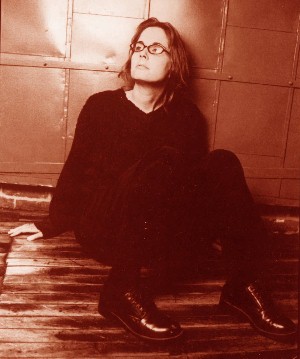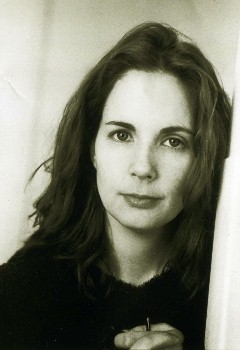Lori McKenna at Rosendale Cafe Sat, June 29
by Irv Yarg
|
 |
They're here, those gleeking fool-born varlets, all around us! Bent to make life miserable, those pribbling rump-fed clotpoles! And not every fobbing beef-witted dewberry is an office-holder, either...
Who are they? The ones with the accents, of course! Not foreign accents, you spleeny pottle-deep moldwarp! Foreign accents can be varying degrees of charming. I mean those sleepy-eyed drawls from Texas, step-ladder sling-phrases from Maine, curling patois from New Orleans and those easterners who go riding in their ka. That's what I'm taking about!
Now, Lori McKenna, a rising talent from Stoughton, Massachusetts, who'll be playing her first area gig at Rosendale Cafe this Saturday evening, has lived all of her 32 years in an area crawling with Red Sox fans and she has scarcely a trace of Bostonian inflection in her normal speaking voice. Strangely, however, when melody catches hold of her words, it imparts an odd embellishment of enunciation...a sort of vague 'twang' which suggests some kind of mountain-rural secret life.
 It's not that her songs are country songs. They're not. They're
closely etched, musing and finely crafted portraits of life situations
and reflections from an observant mind. Their vocals flow and flicker,
punch and beam, and even, on sensuously lazy numbers like "This Fire,"
glide compellingly along with Rickie Lee Jones serenity. It's just that,
in their distinctly non-country settings, McKenna's lyrics come tinted
with hints of Southern origin.
It's not that her songs are country songs. They're not. They're
closely etched, musing and finely crafted portraits of life situations
and reflections from an observant mind. Their vocals flow and flicker,
punch and beam, and even, on sensuously lazy numbers like "This Fire,"
glide compellingly along with Rickie Lee Jones serenity. It's just that,
in their distinctly non-country settings, McKenna's lyrics come tinted
with hints of Southern origin.
When asked about this, Lori seems more than a little mystified.
"I didn't start singing out of the house until I was 27," McKenna muses. "People ask me where I got this style of singing and the only thing I can think of is that I never intended on being a singer. So, with that, I think I never contoured (my voice) in any way, shape or form. I just kind of let it sound the way it did when it came out."
From someone surrounded by people who drive kas, that didn't even begin to answer the question. Come on, Lori, if it evolved as part of your singing style, how did it develop? Where did it come from in the first place?
"I honestly never thought I could sing very well," McKenna admits, cutting against estimations of a growing throng of fans. "Especially compared to my siblings- who all have very pretty voices."
McKenna, drawn to writing poetry and "making up stories" at a tender age, immediately tapped those inclinations when she started taking guitar lessons at 12 or 13 to create songs "as per (her) brother's suggestion."
"I still remember the first song I wrote because that was quite exciting to me," she recalls. "It was, strangely enough, this country song. So, it's kind of strange it came out that way."
Hmmm...If Patsy Kline were reincarnated into a New England environment in the 1970s, what would she sound like? No, forget it. Let's save the more mystical analogies for later review in a supermarket tabloid. McKenna's approach to songwriting is as down-to-earth and personal as her lifestyle. She was six years old when her mother died and left a lingering hollow space in her young life. A stirring song on her new album probes this aching terrain.
If a country song was surprising as a first composition, in view of an absence of the genre as an environmental influence, it is no less so than her emergence into the active folk scene of the Boston area as an unknown mother of three with one more soon to be on the way. Wedging musical time into a domestic scene so utterly packed with life-absorbing responsibilities and cares requires not only uncommonly generous spousal support but robust vision and desire. Did I mention spunk? I did? That's such a cheesy term. I didn't think I would do that...
"I always start with a guitar, playing around with some chords and then I start making up a melody," says McKenna in description of her songwriting regimen. "The melody is always first and, usually, I just sit down for the sake of sitting down to write. Very rarely do I have an idea in my head before I settle in with the guitar. Then, I'll just fiddle around with some words and, if I'm lucky, they'll click in with the melody and in an hour's time or so, I'll have at least a line or two lines or, if I'm really lucky, a whole chorus of something to keep until the following day or three hours later or whenever I can get back to it."
 Juggling time can be as creative a task as blending chords and
opportunities "come in stages," as McKenna notes. Presently, mornings-
after the boys are off to school and the baby's calm and giggly- afford
the most favorable occasions for such fruitful work. Late at night
sometimes provides another window for an application of whatever
energies have survived the day.
Juggling time can be as creative a task as blending chords and
opportunities "come in stages," as McKenna notes. Presently, mornings-
after the boys are off to school and the baby's calm and giggly- afford
the most favorable occasions for such fruitful work. Late at night
sometimes provides another window for an application of whatever
energies have survived the day.
"The other day I was working on something that isn't finished but the whole day was interrupted by pockets of me sneaking away and fiddling and humming and things like that," Lori recalls. "If something is going to hit me and the song is sort of...right there, I'll put the guitar away and pick it up whenever I can, sometimes five or six times throughout the day I'll sneak in and pull it back out. And the kids are great because they're just so used to it."
It might seem that this kind of schedule might make you want to yodel. But Lori doesn't yodel. Lori isn't overtly "country" at all. There's just that little tinge of Blue Ridge at the edges which makes you wonder how it got there.
McKenna acknowledges seeing a vocal coach when she first started playing local clubs, learning new breathing techniques and modifying a natural twist in her tone which drifted in unexpectedly now and then but, she insists, she doesn't sound dramatically different now than she did six years ago at her professional debut.
Edging back to her speaking voice and its lack of Bostonian accent prompts McKenna to admit that her inflections may be a bit atypical to her area.
"As I've gotten older, I've realized that people from Boston make fun of the way I talk," McKenna notes. "If you were from California and asked where I was from, I'd generalize and say 'I'm from Boston' but people always get me on it and say 'you don't sound like you're from Boston.' So, I think it's a Stroughton thing."
But, wait a minute, your Stroughton friends don't twang their songs.
McKenna recalls a time when an office she was working at was putting in an answering machine system and McKenna was the first of 10 women in the office to be nixed for the role of machine voice because her accent was "too strong."
Now, hold on. McKenna's speaking voice harbors neither twang nor Bostonian tonians. And, one more step back, just exactly what is an accent? Linguistics can tell you all about the pitch and stress of your regional ablaut without leaving you a clue as to what an accent really is and how it becomes manifest with nary a circumflex involved.
 One website you may encounter if you took the quest for an accent's
origin to the net, refers rather despondently to the plight of
"(m)ainstream English, (which) under the relentless influence of media's
unifying force, is fast becoming a dry and brisk language, devoid of
character and romance."
One website you may encounter if you took the quest for an accent's
origin to the net, refers rather despondently to the plight of
"(m)ainstream English, (which) under the relentless influence of media's
unifying force, is fast becoming a dry and brisk language, devoid of
character and romance."
It's hard to disagree but you are cautioned to note that this is a site devoted to the revival of Elizabethan English and contains such instruction as Matthew A Lecher's methods for cussing effectively with terms which would have been comfortable for Shakespeare and Marlowe. But Lecher's a dissembling tardy-gaited puttock, so don't let it affect you.
When I mention to McKenna that my own childhood was punctuated by repeated swings of residence from a southwestern state to a northeastern one and back again just as a regional tone was beginning to assert itself and leaving me sounding always the outsider, she responds by mentioning how amazing it is that our habits adapt so quickly, especially kids.
"If you took me to Kentucky, I wouldn't need to be there long," she laughs. "I just start reflecting whomever I'm with. I start talking like them."
Is it suggestibility? Does this kind of trait mean you'd be a good
hypnotic subject? Where do accents
"I think that if I did move somewhere, my singing voice would
probably change," ventures McKenna, seeming to enjoy this line of
inquiry. She recalls her brother having a nanny from Arkansas staying
with his family for a summer and, by the end of the season, falling into
the nanny's speech patterns while in her presence. Could this be a twang
root? Nope. It was only a couple of years ago...
Early, early influences. Lori is the youngest of six siblings. Her
parents were fans of musicals. They loved
Oklahoma. Could
that have been it? Performance is a higher form of self-projection. Was
there a character whose vocal abilities so impressed her that she
subconsciously assumes that persona, twang and all, when she projects?
It's a possibility, McKenna concedes but
West Side Story was
an even bigger favorite and she doesn't sing like that musical's Maria
character. Hmmm...
"I don't think I had my own record collection when I was a kid. I
just had whatever my brothers and sister had," Lori recalls. "You know
how older siblings are just gods to you when you're growing up? That's
how I saw it, at least; they were
the experts."
So, what did they play? Okay, no country music stations. J.Geils,
Neil Young, Carly Simon, Carole King...what else?
"I have a brother that's just a huge James Taylor fan."
When McKenna self-released her first CD,
Paper Wings & Halo
in 1998, the reaction was swift and positive.
The Boston Globe
placed it in their top ten of the year list among the elite
names of the area's songwriting performers. Within a year she had won a
Boston Music Award and appeared at the Newport Folk Festival.
More recently, her second release,
Pieces of Me, has
emerged from a national label and elevated her as a new American voice
of reckoning. Her songs are poignant, fresh and stirring. Her
performances captivating. Mysterious twang or not.
You'd have to be a beslubbering folly-fallen ratsbane to miss her
debut area performance on Saturday night.
-Irv Yarg
Bells are going off. Do you hear them?

Pieces of Me
Irv Yarg is an internationally published observer on cultural and
political events who resides in the Hudson Valley area. His analysis of
the recent and ongoing musical history of the region will be featured as
a part of our coverage of the local scene.